六年级英语常用动词的各种形式_
动词的基本形式

She likes swimming, butt her brother prefers mountain-climbing.
My father doesn’t smoke because he thinks it harmful.
(3)表示客观事实或普遍真理。
A.基本概念:
a. 现在完成时表示过去已完成的行为或终止的状态, 它暗示对现在已有一定的影响或结果.
b. 表示过去已经开始,延续到现在的动作和状态,往往和表示一段时间的时间状语连用。
c. has/have been to 去了某地已经回来。Have/has gone to 去了某地还没回来。
2. 以e结尾去掉e加ing take-taking
3. 以重读闭音节结尾双写加ing put -putting
C、用法
(1) 现在进行时表示说话人说话时正在进行的行为,有时与 at this time of ---,listen,look,now等时间状语一起连用。
He is reading a paper on computer. His temperature is going down.
3. 以辅音加y结尾变y为i加es,eg:carry-carries
4. 几个特殊的动词的第三人称单数:be-is have – has go – goes do - does
一般疑问句的变法是:1.添加法:如句中为实意动词动词用动词原形,则在句首加Do;如果动词为第三人称单数,在句首加Does,然后将动词的-s或-es形式变为原形。
When we were at college, we often did lab work together.
最新小学六年级动词过去进行时词汇表
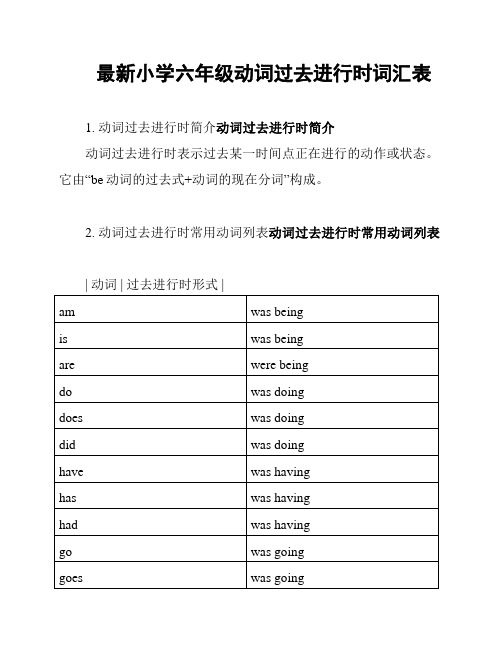
最新小学六年级动词过去进行时词汇表
1. 动词过去进行时简介动词过去进行时简介
动词过去进行时表示过去某一时间点正在进行的动作或状态。
它由“be动词的过去式+动词的现在分词”构成。
2. 动词过去进行时常用动词列表动词过去进行时常用动词列表
| 动词 | 过去进行时形式 |
3. 动词过去进行时的用法示例动词过去进行时的用法示例
- I was reading a book when he called me.was reading a book when he called me.
- They were playing football in the park yesterday.were playing football in the park yesterday.
- She was cooking dinner when the doorbell rang.was cooking dinner when the doorbell rang.
- We were studying for the test the whole night.were studying for the test the whole night.
- He was watching television when his mother came home.was watching television when his mother came home.
根据以上词汇表和示例,你可以更好地理解和使用动词过去进行时。
记住,动词过去进行时适用于描述过去某一时间点正在进行的动作或状态。
动词的各种形式变化规则
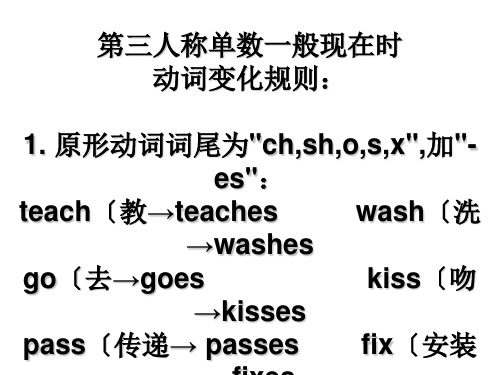
三、用一般现在时填空. What _____ he _____ <have>? He ______ <have> a toy plane. My mother ________ not________ <like> English. She _______ <like> Chinese. ______ you ______ <go > to school by bus? No, I _____ <go> to school by car. Miss Wang ______ <swim > every day. I ___<like> English . Tom ____ ______ _____<not like > English. The moon ______ <go> around the earth. When_____ you ______ <go > to school? I _____ <go> to school at five every day.
give-gave-given shake-shook-shaken fall-fell-fallen see-saw-seen take-took-taken rise-rose-risen <音变>
drive-drove-driven rewrite-rewrote-rewritten write-wrote-written <音变>
不规则动词过去式和过去分词分类记忆法
1.bring-brought-brought 2. buy-bought-bought 3. fight-fought-fought 4. think-thought-thought 2. burn-burnt-burnt mean-meant-meant dream-dreamed/dreamt-dreamed/dreamt learn-learned/learnt-learned/learnt smell-smelled/smelt-smelled/smelt
六年级英语动词用法

六年级英语动词用法六年级英语动词用法英语中共有三种非限定动词,分别是:动词不定式(to do..),动名词(doing..),分词(doing ,done..)。
动词可分为三数:单词,短语动词或动词短语。
The English language contains mang phrasal verbs and verbal phrases.contains是单字动词Students should learn to look up new words in dictionaries.look up是短语动作The young ought to take care of the old.take care of 是动词短语五种形态:原形,第三人称单数形式,过去式,过去分词,现在分词,系动词(联系动词),作为系动词有些不具词义,有些具有词义,但不能单独用作谓语,后面必须跟表语(补语),构成系表结构说明主语的状况,性质,特征情况状态系动词:表示主语状态,只有be一词:如:He is a teacher . is 与补足语一起说明主语的身份。
持续系动词用来表示主语继续或保持一种状况或态度,keep,remain ,stay .如:He always kept silent at meeting感官系动词,feel ,smell, sound , taste如:This flower smells very sweet .表像系动词,seem, appear ,look ..如:He looks tired最常用的助动词有:be ,have ,do, will,shall, should ,would.)协助主要动词构成谓语动词组的词,叫且动词。
)被协助的动词称作主要动词,且动词自身没有词义,不可单独使用。
He doesn't like English.(doesn't 是助动词,无词义,like是主要动词,有词义)When shall we see you next?( shall是助动词)动词answer的用法与搭配归纳:1. 用作动词,除表示“回答”“答复”外,还可表示“接(电话)”或对门铃等声响作出反应等(常与call, bell, telephone, door, door-bell等连用)。
英语动词的时态和语态
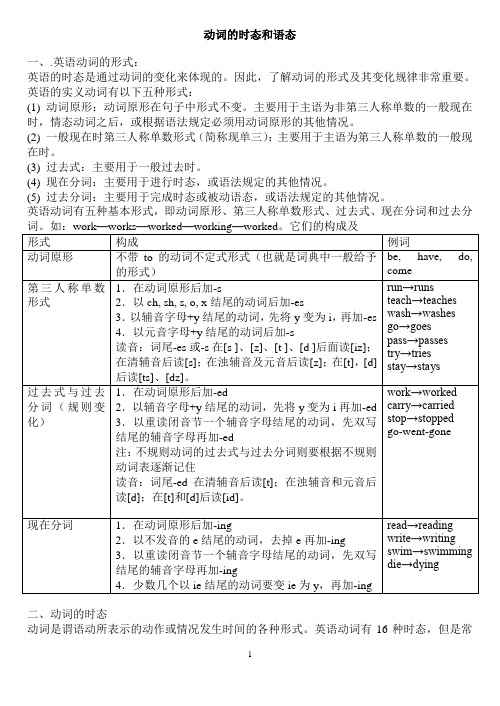
动词的时态和语态一、.英语动词的形式:英语的时态是通过动词的变化来体现的。
因此,了解动词的形式及其变化规律非常重要。
英语的实义动词有以下五种形式:(1) 动词原形:动词原形在句子中形式不变。
主要用于主语为非第三人称单数的一般现在时,情态动词之后,或根据语法规定必须用动词原形的其他情况。
(2) 一般现在时第三人称单数形式(简称现单三):主要用于主语为第三人称单数的一般现在时。
(3) 过去式:主要用于一般过去时。
(4) 现在分词:主要用于进行时态,或语法规定的其他情况。
(5) 过去分词:主要用于完成时态或被动语态,或语法规定的其他情况。
英语动词有五种基本形式,即动词原形、第三人称单数形式、过去式、现在分词和过去分二、动词的时态动词是谓语动所表示的动作或情况发生时间的各种形式。
英语动词有16种时态,但是常用的只有9种:一般现在时、一般过去时、一般将来时、现在进行时、过去进行时、现在完成时、过去完成时、过去将来时、现在完成进行时。
下面分别介绍。
1、一般现在时结构:do/does have/has be(am/is/are)标志语:often,always,usually,sometimes,never,every day ,in +时间段,等。
(1)表示经常性、习惯性的动作;表示主语的身份和特征a. He goes to school every day.b. He is a student/handsome.(2)表示永恒的真理,即使出现在过去的语境中,仍用一般现在时。
如:I learned that the earth goes around the sun when I was in primary school.(3)少数动词用于谈论时间表、节目单或日程表上所安排好的事情。
此类动词有begin, come, leave, go ,arrive, start , stop, return, open, close等The train leaves at 8:50. The meeting begins at seven.b. The rain starts at nine in the morning.(4) 在时间状语从句和条件状语从句中,用一般现在时表示将来。
动词的各种形式变化

一、动词单三形式的构成规则:①一般动词在词尾加-s②以字母s,x,ch,sh,o结尾的动词加一es③以元老字母+y结尾的动词,直接加s④以辅音字母加y结尾的动词,先变y为i,再加-es.二、规则动词的过去式变化如下:1)、一般情况下,动钩钩尾加-ed,如:work -------- w orked play --------- played wanted ----------- wanted act ----------- acted2)、动词原形以(不发音的)-e结尾动词,动词词尾加—d,如:live ------ lived move -------------- moved taste ----------------- tasted hope ---------------- hoped 3)、动词原形以“辅元辅”结尾,先取写词尾辅音字母,再加一ed (字母组合除外),如: stop --------- s topped (批注:动词原形词尾以“元音+■-1,-r” ,并为重读音节时,取写r,l,再加一ed,如:compel, travel, prefer , refer)4)、动词原形以辅音字母+ y结尾的动词,把-y变为-i再加-ed,如:study ------- s tudied copy -------------- copied cry ------------- cried carry -------------- carried动词原形以元音字母加y结尾的词,直接加-ed,如:play ----- played enjoy ----------------- enjoyed stay --------------- stayed过去分词枸成口诀:过去分词很好记,动词后缀加ed o直接加、去e加、双写加。
还有一点要注意,Y前元辅不统一。
三、不规则动词的过去式的枸成(不规则动词的过去式变化规律性不强,须多加记忆o)1.英语中有些动词的过去式和过去分词形式变化不规则,可分为五种情况。
动词的各种形式和分类

动词的各种形式和分类————————————————————————————————作者:————————————————————————————————日期:动词的各种形式和分类复习要点阐述动词的语法现象较为复杂,难度较大,是中考中重点考查的知识之一,了解动词的各种形式以及动词的分类,特别是注意动词的语法意义,不同的词形和固定搭配用法是非常重要的,可以说英语是由许许多多的搭配用法而组成的。
今天我们这个专题中将复习动词的各种形式和分类。
通过这种复习,使同学们明白在初中阶段动词的用法的原因。
我们主要复习归纳以下的内容:1.动词的各种形式;2.动词的种类(1)实义动词(2)联系动词(3)情态动词和助动词3.动词短语一、动词的各种形式英语动词有五种基本形式,即动词原形、一般现在时第三人称单数、过去式、过去分词和现在分词。
规则动词的五种形式如下表所示(以动词walk,like,stop,play为例): 原形第三人称单数过去式过去分词现在分词walk walks walked walked walkinglikelikes liked liked likingstop stops stopped stoppedstoppingplay plays played playedplaying 1.一般现在时第三人称单数的构成动词的一般现在时第三人称单数的构成如下表所示:2.规则动词过去式、过去分词的构成规则动词过去式、过去分词的构成如下表所示: 特别提示:travel的过去式和过去分词英国写法为travelled,travelled,而美国写法为tra veled,traveled。
在英语中这样的动词还有quarrel等。
发音规则:动词第三人称单数的发音规律与名词的复数形式发音规律是一致的。
动词的过去式和过去分词发音规律为:③现在分词的构成现在分词的构成如下表所示:规则动词原形现在分词一般情况下直接加-ing ask,study,standasking,studying,standing以不发音的e结尾的动词,去掉e再加-ingcome,take,write,becomecoming,taking,writing,becoming以重读闭音节结尾,末尾只有一个辅音字母的动词,要双写辅音字母再加-ingsit,begin,run,stopsitting,beginning,running,stopping少数以ie结尾的动词,先变ie为y,再加-ingdie,lie,tie dying,lying,tying以oe,ee,ye结尾的动词,直接加-ingsee,agree seeing,agreeing 常用必背:在变为现在分词时须双写最后一个字母的常用动词有:begin 开始cut 切割dig挖drop掉forget忘记get 使、得到hit 击中let让prefer更喜欢put放run跑sit坐shop买东西stop停止swim 游泳refer 参考以辅音字母+y结尾的动词,去掉y加-ies变为第三人称单数形式,加-ied变为过去式和过去分词的常用动词有:carry携带copy 抄cry哭fry油煎hurry 快走spy侦探study学习try 试tidy整理worry担忧二、动词的种类根据不同的分类方式,动词可分为不同的类型。
变化规则4大时态动词形式总结(知识清单)译林版英语六年级上册
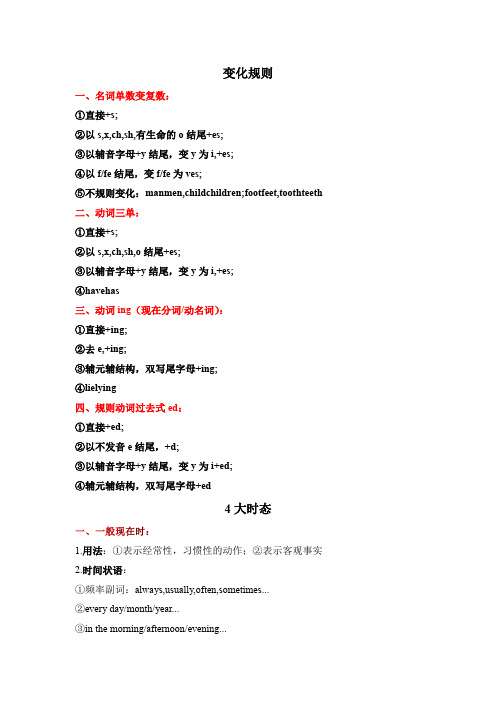
变化规则一、名词单数变复数:①直接+s;②以s,x,ch,sh,有生命的o结尾+es;③以辅音字母+y结尾,变y为i,+es;④以f/fe结尾,变f/fe为ves;⑤不规则变化:manmen,childchildren;footfeet,toothteeth 二、动词三单:①直接+s;②以s,x,ch,sh,o结尾+es;③以辅音字母+y结尾,变y为i,+es;④havehas三、动词ing(现在分词/动名词):①直接+ing;②去e,+ing;③辅元辅结构,双写尾字母+ing;④lielying四、规则动词过去式ed:①直接+ed;②以不发音e结尾,+d;③以辅音字母+y结尾,变y为i+ed;④辅元辅结构,双写尾字母+ed4大时态1.用法:①表示经常性,习惯性的动作;②表示客观事实2.时间状语:①频率副词:always,usually,often,sometimes...②every day/month/year...③in the morning/afternoon/evening...3.动词三单的变化规则:①直接+s;②以s,x,ch,sh,o结尾+es;③以辅音字母+y结尾,变y为i,+es;④havehaseg.She often gets up at six in the morning.1.用法:表示现在正在发生的动作(be+动词ing)2.时间状语:①now,at the moment...②Look! Listen!..③It’s ..o’clock.(Don’t talk.Where’s ...?)...3.动词现在分词的变化规则:①直接+ing;②去e+ing;③辅元辅结构,双写尾字母+ing;④lielyingeg.She is watching TV now.1.用法:①表示过去发生的动作;②表示过去存在的状态;③表示过去经常反复发生的动作;④表示已故的人所做的事情;2.时间状语:①...ago(two days ago;long long ago...)②last...(last year;last night...)③介词+时间名词(in 1999...)④yesterday;just now;then(那时...3.规则动词过去式的变化规则:①直接+ed;②以不发音的e结尾,直接+d;③以辅音字母+y结尾,变y为i,+ed;④辅元辅结构,双写尾字母+edeg.I saw a film last night.四、一般将来时:1.用法:①表示将来会发生的动作;②表示将来会存在的状态;2.构型:be going to do sth. / will+动词原形3.时间状语:①tomorrow及相关短语;②next..(next year/month/week..)eg.I am going to watch a film tomorrow.动词适当形式总结①在一般现在时里,主语不是三单,则用动词原形;②情态动词can,should,must+动词原形;③助动词Do/Does/Did... don’t/doesn’t/didn’t+动词原形④let sb. do sth. help sb. do sth.2.动词三单在一般现在时里,主语是三单,则动词用三单形式3.动词ing①现在进行时的构型:be+动词ing②go,like,be+动词ing;be good at/before/about/for(等介词)...+动词ing4.动词不定式(to do sth)①want/would like to do sth②what/how/which+to do sth③be+形容词(happy/sorry/nice...) to do sth④ask sb to do sth, use/reuse sth. to do sth。
六年级语法知识点总结英语

六年级语法知识点总结英语六年级学生需要掌握的一些重要英语语法知识点包括:1. 动词时态:学生需要掌握现在时、过去时和未来时等时态的用法。
例如,他们需要知道 how often, when 和 why 等问题如何使用现在时来表达。
2. 动词形式:学生需要了解动词的各种形式,如原型、过去式、现在分词和过去分词等。
他们需要学会如何正确地使用这些形式来表达不同的语境。
3. 代词用法:学生需要掌握各种代词的用法,如 it, they, this, that 等。
他们需要学会如何使用这些代词来表达句子的完整性和准确性。
4. 形容词和副词:学生需要了解形容词和副词的用法,如比较级和最高级、副词的位置和用法等。
他们需要学会如何正确地使用这些词来表达句子的意思。
5. 句子结构:学生需要掌握基本的句子结构,如主语、谓语、宾语等。
他们需要学会如何使用这些结构来表达句子的含义。
6. 疑问句:学生需要了解如何构建一般疑问句、特殊疑问句和选择疑问句等疑问句。
他们需要学会如何使用这些疑问句来询问信息。
7. 介词:学生需要了解介词的用法,如 in, on, at 等。
他们需要学会如何使用这些介词来表达句子的意思。
拓展:除了上述知识点外,六年级的学生还需要注意以下方面:1. 句子成分:学生需要了解句子中不同的成分,如主语、谓语、宾语等。
他们需要学会如何正确地使用这些成分来表达句子的意思。
2. 修辞手法:学生需要了解一些常见的修辞手法,如比喻、拟人、夸张等。
他们需要学会如何正确地使用这些手法来增强文章的表现力。
3. 阅读理解:学生需要掌握阅读理解的技巧,如猜测词义、理解段落大意等。
他们需要学会如何快速有效地理解文章并获取所需信息。
4. 写作技巧:学生需要掌握写作的技巧,如句子结构、修辞手法、词汇选择等。
他们需要学会如何写出清晰、有力的英语句子,并增强文章的表现力。
英语动词100个六年级

英语动词100个六年级abandon[E5bAndEn] vt.1.离弃,丢弃2.遗弃,抛弃3.放弃,中止abide[E5baId] vt.容忍,忍受,忍耐abolish[E5bRlIF] vt.彻底废除,废止(法律或制度)abound[E5baJnd] vi.1.大量存在2.充满,富于(in, with)absent[5AbsEnt] vt.使缺席(后接oneself)absorb[Eb5sC:b] vt.1.吸收2.吸引…的注意,使全神贯注3.把…并入,并吞,同化abstain[Eb5steIn] vi.1.弃权2.戒除,节制(from)abstract[Ab5strAkt] vt.1.做…的摘要2.提取,抽取abuse[E5bju:z] vt.1.滥用,妄用2.虐待,伤害3.辱骂,毁谤accelerate[Ek5selEreIt] v.(使)加快,(使)增速accent[5AksEnt] vt.重读accept[Ek5sept] vt.1.接受,领受,收受2.承认,同意,认可3.相信access[5Akses] vt.存取(计算机文件)acclaim[E5kleIm] vt.向…欢呼,为…喝彩accommodate[E5kRmEdeIt] vt.1.容纳2.向…提供住处(或膳宿) 3.使适应,顺应accompany[E5kQmpEnI] vt.1.陪伴,陪同2.伴随,和…一起发生3.为…伴奏(或伴唱)accomplish[E5kRmplIF] vt.达到(目的),完成(任务),实现(计划诺言等) accord[E5kC:d] vi.相符合,相一致,相和谐(with) vt.授予,赠与,给与account[E5kaJnt] vi.(for)1.说明…的原因,是…的原因2.(在数量、比例方面)占accumulate[E5kju:mjJleIt] vt.堆积,积累积聚 vi.累积,聚积accuse[E5kju:z] vt.指控,控告,指责ache[eIk] vi.1.痛,疼痛2.渴望achieve[E5tFi:v] vt.完成,实现,达到 vi.成功acknowledge[Ek5nRlIdV] vt.1.承认,承认…的权威(或主张) 2.告知收到,确认3.对…表示谢忱,报偿acquaint[E5kweInt] vt.使认识,使了解,使熟悉(with)acquire[E5kwaIE] vt.1.取得,获得2.学到acquit[E5kwIt] vt.1.宣判…无罪2.使(自己)作出某种表现(oneself)act[Akt] v.1.行动,做事2.举止,表现3.起作用4.表演,假装vt.扮演,装做activate[5AktIveIt] vt.使活动起来,使开始起作用adapt[a5dApt] vt.使适应,使适合2.修改,改编vi.适应(to)add[Ad] vt.1.添加,增加2.把…加起来,计算…的总和3.进一步说(或写),附带说明vi.1.增添(to) 2.补充addict[5AdIkt] vt.使成瘾,使入迷address[E5dres] vt.1.(在信封或包裹上)写姓名地址2.向…作(正式)讲话,对…发表演说3.称呼4.对付,处理adhere[Ed5hIE] vi.1.粘附,附着(to) 2.遵守,坚持(to) 3.追随,支持(to) adjoin[E5dVCIn] vt.贴近,与…毗连adjourn[E5dV\:n] v.(使)体会,(使)休庭adjust[E5dVQst] vt.1.校正,校准,调整2.调节,改变…以适应vi.适应(to)administer[Ed5mInIstE] vt.1.掌管,料理…的事务2.施行,实施3.给予,派给,投(药)admire[Ed5maIE] vt.1.钦佩,赞赏,羡慕2.称赞,夸奖admit[ad5mIt] vt.1.承认,供认2.准许…进入,准许…加入vi.承认adopt[E5dRpt] vt.1.收养2.采取,采纳,采用3.正式通过,批准adore[E5dC:] vt.1.崇拜,敬慕,爱慕2.非常喜欢adorn[E5dC:n] vt.装饰,使生色advance[Ed5vB:ns] vi.1.前进,向前移动2.取得进展3.(价格等)上涨,增加vt.预先发放,预先支付2.提前,使提前发生3.提出(建议等)advertise[5AdvEtaIz]vt.1.为…做广告,宣传2.(在报刊、电视、广播等中)公告,公布vi.登广告,做广告,登公告advise[Ed5vaIz] vt.1.劝告,忠告,向…提供意见2.建议3.通知,告知vi.提供意见,建议advocate[5AdvEkeIt] vt.拥护,提倡,主张affect[E5fekt] v.影响affiliate[E5fIlIeIt] vt.使隶属(或附属)于affirm[E5f\:m] vt.1.断言,坚持声称2.证实,确认afflict[E5flIkt] vt.使苦恼,折磨afford[E5fC:d] vt.1.买得起,担负得起2.提供,给予age[eIdV] v.1.(使)显老,(使)变陈旧2.(使)变陈,(使)成熟aggravate[5A^rEveIt] vt.1.加重,加剧,使恶化2.激怒,使恼火aggregate[5A^rI^eIt] vt.1.总计达,合计2.使聚集,使积聚agitate[5AdVIteIt] vi.煽动,鼓动(for, against) vt.1.搅动,摇动2.使焦虑不安agree[E5^ri:] vi.1.同意,赞同2.相同,相符,一致3.(气候食物等)相宜,相和vt.同意,承认aid[eId] vt.帮助,援助,救助aim[eIm] vt.1.把…瞄准,把…对准2.使针对,使旨在vi.1.瞄准,对准(at, for) 2.打算,企图(at, for) 3.致力,旨在(at, for)air[eE] vt.1.晾干2.使通风3.使公开,使公众注意alarm[E5lB:m] vt.使惊恐,使担心alert[E5l\:t] vt.1.向…报警,使警惕2.使认识到,使意识到alienate[5eIljEneIt] vt.1.使疏远,使不友好,离间2.转让,让渡(财产等) allege[E5ledV] vt.断言,宣称,硬说alleviate[E5li:vIeIt] vt.减轻,缓解,缓和allocate[5AlEkeIt] vt.分配,分派,把…拨给allot[E5lRt] vt.分配,拨出allow[E5laJ] vt.1.允许,准许,容许2.允许…进入(或停留) 3.同意给4.承认alloy[5AlCI] vt.将…铸成合金allude[E5lju:d] vi.暗指,提及(to)allure[E5ljJE] vt.诱或,引诱,吸引ally[E5laI] v.(使)给盟,(使)联合alter[5C:ltE] v.改变,改动,变更alternate[5C:lt\:neIt] v.(使)轮流,(使)交替amass[E5mAs] vt.积累,积聚amaze[E5meIz] vt.使大为惊奇,惊愕amend[E5mend] vt.修改,修订,改进amount[E5maJnt] vi.1.合计,共计(to) 2.(在意义、价值等方面)等同,接近(to) amplify[5AmplIfaI] vt.1.放大(声音等),增强2.扩大,详述,进一步阐述amuse[E5mju:z] vt.1.逗乐,逗笑2.给…提供娱乐(或消遣)analyze[5AnElaIz] vt.分析,细察,细查anchor[5ANkE] vt. 1.抛(锚),泊(船) 2.把…系住,使固定3.担任(电视节目等的)主持人vi.1.抛锚,停泊2.固定,扎根anger[5AN^E] vt.使发怒,激怒angle[5AN^l] vt.1.把…放置成一角度2.使(新闻、报道等)带上倾向性annex[E5neks] vt.兼并,吞并announce[E5naJns] vt.1.宣布,宣告2.声称,叙说3.预告,预示annoy[E5nCI] vt.1.使恼怒,使烦恼2.打扰,干扰answer[5B:nsE] v.1.回答,答复2.解答,解决(问题) 3.(对…)作出反应,响应anticipate[An5tIsIpeIt] vt.1.预期,期望,预料2.先于…行动,提前使用ape[eIp] vt.模仿apologize[E5pRlEdVaIz] vi.道歉,认错,谢罪appall[E5pC:l] vt.使惊骇,使大吃一惊appeal[E5pi:l] vi.1.呼吁,恳求2.有吸引力,有感染力3.上诉,申诉4.诉者,诉请裁决(或证实等) (to) vt.将…上诉,将…移交上级法院审理appear[E5pIE] vi.1.出现,显露,来到2.看来好像,似乎3.产生,发表,问世appease[E5pi:z] vt.平息,抚慰,姑息applaud[E5plC:d] vi.鼓掌,喝彩 vt.1.向…鼓掌,向…喝彩2.称赞,赞许apply[E5plaI] vi.1.申请,请求2.适用vt.1.使用,运用,实施2.涂,敷,施appoint[E5pCInt] vt.1.任命,委派2.约定,确定,指定(时间、地点) appreciate[E5pri:FIeIt] vt.1.重视,常识,欣赏2.为…表示感谢3.(充分)意识到,领会,体会 vi.增值apprehend[7AprI5hend] vt.逮捕,拘押approach[E5prEJtF] v.靠近,接近appropriate[E5prEJprIeIt] vt.1.私占,侵吞,挪用2.拨出(款项等)供专用approve[E5pru:v] vt.1.赞成,同意2.批准,对…表示认可vi.赞成,称许(of) approximate[E5prRksImIt] vi.近似,接近(to) vt.1.近似,接近2.估计arch[B:tF] v.(使)成拱形 vi.争论,争吵,争辩 vt.1.提出理由证明,(坚决)主张2.说服,劝说arise[E5raIz] vi.1.产生,出现,发生2. (由…)引起,(由…)产生,起源于(from) 3.起身,起床arm[B:m] vt.1.以(武器)装备2.提供,配备,支持arouse[E5raJz] vt.1.引起,激起,唤起2.唤醒arrange[E5reIndV] vt.1.安排,准备,筹划2.整理,排列,布置vi.作安排,作准备,筹划array[E5reI] vt. 1.排列,配置(兵力) 2.打扮,装饰arrest[E5rest] vt.1.逮捕,拘留,扣留2.停止,阻止3.吸引arrive[E5raIv] vi.1.到达,到来2.(时间等)来临3.达到,达成(at) articulate[B:5tIkjJleIt] vt.1.明确有力地表达2.清晰地吐(字),清晰地发(音)ascend[E5send] vi.渐渐上升,升高 vt.攀登,登上ascertain[7AsE5teIn] vt.查明,弄清,确定ascribe[E5skraIb] vi.1.把…归因于(to) 2.把…归属于(to)ask[B:sk] vt.1.问,询问2.请求,恳求,要求3.邀请,约请vi.1.问,询问2.请求,要求(for) 3.探问,问起(after)aspire[Es5paIE] vi.渴望,追求,有志于(to, after)assault[E5sC:lt] vt.(武力或口头上的)攻击,袭击assemble[E5sembl] vi.集合,聚集 vt.1.集合,聚集,召集2.装配assert[E5s\:t] vt.1.肯定地说,断言2.维护,坚持chauffeur[5FEJfE] v.为…开车cheat[tFi:t] vt.欺骗,骗取vi.行骗,作弊check[tFek] vt.检查,核对2.突然停止,制止3.用钩形符号标出vi.检查,核对2.使突然停止,收住cheer[tFIE] vt.1.使振奋,使高兴2.向…欢呼,向…喝彩vi.欢呼,喝彩cherish[5tFerIF] vt.1.珍爱,珍视2.爱护,抚育3.抱有,怀有(希望、想法、感情等)chew[tFu:] v.咀嚼,咬chill[tFIl] vt.使变冷,使冷冻,使感到冷chip[tFIp] vt.削(或凿)下(屑片或碎片)choke[tFEJk] v.1.(使)窒息,呛2.塞满,塞住choose[tFu:z] vt.1.选择,挑选2.情愿,决定chop[tFRp] v.砍,劈,斩chorus[5kC:rEs] vt.齐声说,随声附和chuckle[tFQkl] vi.轻声笑,咯咯笑circle[5s\:kl] vt.1.围着,圈出2.环绕…移动vi.盘旋,环行circulate[5s\:kjJleIt] v.1.(使)循环,(使)流通2.(使)流传,散布,传播cite[saIt] vt.引用,引证2.传唤,传讯3.表彰,喜奖civilize[5sIvIlaIz] vt.使文明,使开化claim[kleIm] vt.1.声称,断言2.对…提出要求,索取3.(灾难等)使失踪或死亡4.需要,值得clamp[klAmp] vt.(用夹具等)夹紧,夹住,固定clap[klAp] vi.拍手,鼓掌vt.拍,击clarify[5klArIfaI] vt.澄清,阐明clash[klAF] vi.1.发生冲突2.不协调3.砰地相撞,发出刺耳的撞击声clasp[klB:sp] vt.1.抱紧,握紧2.扣住,扣紧classify[5klAsIfaI] vt.把…分类,把…分级clatter[5klAtE] v.(使)发出连续而清脆的撞击声claw[klC:] v.(用爪)抓,撕clean[kli:n] vt.把…弄干净,除去…的污垢cleanse[klenz] vt.使清洁,使纯洁,清洗clear[klIE] vt.1.扫清,清除2.使清楚,使明白3.使清白无辜,证明…无罪 vi.变晴,变清澈clench[klentF] vt.1.捏紧(拳头等),咬紧(牙齿等) 2.紧紧握住click[klIk] v.(使)发出咔哒声climb[klaIm] vi.1.攀登,爬2.上升,增长vt.攀登,爬clinch[klIntF] vt.解决,达成vi.扭抱,拥抱cling[klIN] vi.1.紧紧抓住(或抱住) (to) 2.黏着,挨近(to) 3.依附,依恋(to) 4.坚持,墨守,忠实于(to)believe[bI5li:v] vt.1.相信2.认为 vi.相信bellow[5belEJ] vi.咆哮,怒吼2.(公牛般地)吼叫vt.大声发出,大声喝道belong[bI5lCN] vi.1.属于,是…的成员(to) 2.应被放置(在某处),应归入3.适应,合得来bend[bend] vi.1.俯身2.弯曲,转弯vt.使转向,使弯曲benefit[5benIfIt] vt.有益于 vi.得益besiege[bI5si:dV] vt.1.围攻,围困2.围住,拥在…周围bestow[bI5stEJ] vt.赠与,授予bet[bet]vt.1.以…打赌,与…打赌2.敢说,确信vi.打赌betray[bI5treI] vt.1.背叛,出卖2.失信于,辜负3.泄露(秘密等) 4.(非故意地)暴露,显露better[5betE] v.改善,改进,提高ad.更,更好地beware[bI5weE] v.谨防,当心bewilder[bI5wIldE] vt.使迷惑,使难住bias[5baIEs] vt.使有偏见bicycle[5baIsIkl] vi.骑自行车bid[bId] vi.喊价,出价,投标 vt.1.出(价),喊(价) 2.祝,表示3.命令,吩咐bill[bIl] vt.1.用招贴(或广告、报纸等)宣布2.给…开帐单billow[5bIlEJ] vi.翻腾,汹涌bind[baInd] vt.1.捆绑,捆扎2.使给合,使粘合3.约束4.装订bite[baIt] v.咬,叮black[blAk] v.(使)变黑blackmail[5blAkmeIl] vt.敲诈,勒索,要挟blame[bleIm] vt.指责,责怪2.把…归咎于(on, onto)blast[blB:st] vt.炸,炸掉blaze[bleIz] vi.1.熊熊燃烧,着火2.发(强)光,放光彩3.迸发,爆发bleach[bli:tF] v.(使)变白,漂白bleed[bli:d] vi.出血,流血vt.勒索…的钱blend[blend] v.(使)混和,(使)混杂bless[bles] vt.1.使有幸得到,使具有(with) 2.为…祈神赐福(或保佑) blight[blaIt] vt.破坏,摧残blind[blaInd] vt.1.使失明2.使失去判断力blink[blINk] vi.1.眨眼睛2.闪亮,闪烁blister[5blIstE] v.(使)起泡block[blCk] vt.1.堵塞,阻塞2.阻碍,妨碍bloody[5blQdI] vt.使为血所污,血染bloom[blu:m] vi.开花blossom[5blRsEm] vi.1.(植物)开花2.发展,长成(out, into)blot[blRt] vt.1.(用墨水等)弄脏2.(用吸墨纸)吸干blow[blEJ] v.1.吹,吹动2.吹气,充气3.吹响,吹奏4.(使)爆炸bluff[blQf] v.虚张声势,吓唬blunder[5blQndE] vi.1.跌跌撞撞地走,慌乱地走2.犯错误blunt[blQnt] vt.1.使迟钝,使减弱2.使钝blur[bl\:] v.(使)变模糊blurt[bl\:t] vt.脱口而出(out)blush[blQF] vi.脸红board[bC:d] vt.上(船、车或飞机) vi.1.登机,上船2.搭伙,膳宿boast[bEJst] vi.自夸,夸耀(of, about) vt.1.夸口,吹嘘2.以拥有…而自豪。
英语动词词汇大全

英语动词词汇大全动词在小学英语中一定要学习的,下面为大家介绍英语动词词汇大全,希望能帮到大家!play/plei/玩swim/swim/游泳skate/skeit/溜冰fly/flai/飞jump/dmp/跳walk/w:k/走run/rn/跑climb/klaim/爬fight/fait/打架swing/swi/荡秋千eat/i:t/吃sleep/sli:p/睡觉like/laik/喜欢have/hv/有buy/bai/买take/teik /拍(照),带live/liv/居住teach/ti:t/教go/gu/去study/'stdi/学习learn/l:n/学习sing/si/唱歌dance/dɑ:ns/跳舞row/ru/划read books读书do homework做作业watch TV /wt/ 看电视cook the meals /kuk mi:l/ 烧菜water the flowers /'flau/浇花sweep the floor /swi:p fl:/拖地clean the bedroom /kli:n 'bedrum/清扫房间make the bed铺床叠被set the table /'teibl/摆餐桌wash the clothes /w kluz/洗衣服wash the dishes /di/洗盘子use a puter /km'pju:t/用电脑do morning exercises /'m:ni 'ekssaiz/做早操eat breakfast /i:t 'brekfst/吃早餐eat dinner /'din /吃晚饭go to school去上学have English class上英语课play sports/plei sp:ts/体育运动get up起床climb mountains/klaim 'mauntins/爬山go shopping去购物play the piano /pi'nu/ 弹钢琴visit grandparents /'vizit 'grnd,prnt/拜访祖父母go hiking /haik/ 去远足fly kites /flai kaits/ 放风筝make a snowman /meik 'snu,mn/堆雪人plant trees /plɑ:nt tri:z/ 植树draw pictures /dr: 'piktz/画画cook dinner /kuk 'din/烧晚饭read a book 读书answer the phone/'ɑ:ns fun /接listen to music /'lisn 'mju:zik/听音乐clean the room清扫房间write a letter /rait 'let/ 写信write an e-mail写电子邮件drink water /drik 'w:t/ 喝水take pictures /teik 'pikt/ 拍照片pick up leaves /pik p li:vz/ 摘树叶write a report /rait ri'p:t/ 写报告play chess /tes/ 下棋have a piic /'piknik/ 野餐get to到达ride a bike /raid baik/ 骑自行车play the violin /,vai'lin/ 拉小提琴collect stamps /k'lekt stmp/ 集邮meet/mi:t/ 遇见wele/'welkm/ 欢送thank /θk/ 谢谢work /w:k/ 工作drink /drik/ 喝taste /teist/ 尝smell /smel/ 闻feed /fi:d/ 喂milk /milk/ 挤牛奶look /luk/ 看guess /ges/ 猜help /help/ 帮助pass/pɑ:s/ 传递show/u/展示,给……看use /ju:z/ 用clean /kli:n/ 清扫open/'upn/ 翻开close /kluz/ 关put /put/ 放read /ri:d/ 读,看write /rait/ 写paint /peint/ 画画tell /tel/ 告诉kick /kik/ 踢ride /raid/ 骑stop /stp/ 停wait /weit/ 等find /faind/ 找drive /draiv/ 驾驶fold /fuld/ 折叠send /send/送,寄wash /w/ 洗shine/ain/照耀bee/bi'km/变成feel /fi:l/ 感觉think /θik/ 想fall /f:l/ 掉下leave /li:v/ 离开wake up/weik p/醒过来put on穿上take off 脱下hang up /h p/ 挂起来wear /w/ 穿go home回家go to bed去睡觉play puter games /km'pju:t geims/玩电脑游戏play chess /tes/ 下棋do housework /'hausw:k/ 做家务empty the trash/'empti tr/倒垃圾put away the clothes /klu/放好衣服get off下车take a trip/trip/去郊游read a magazine /,mg'zi:n/读杂志go to the cinema /'sinim/去电影院。
动词的各种形式的构成规则

动词的各种形式的构成规则及应用1. 第三人称单数的构成方法(1) 一般情况下由动词后加-s构成:work — works,read - reads等。
(2) 以s, x, z, sh, ch 以及字母o结构的动词,后加-es:guess - guesses, mix - mixes, go - goes, finish - finishes, catch-catches等。
(3) 以辅音字母加y结尾的动词,应将y改为i 再加-es:fly- flies, study -studies等。
4.有个别的变化不规则,如have / has, be / is等。
②词尾-s和-es 读音规则是:在s, x, z, sh, ch 后的es读作[iz],其余的读作[z]。
二.动词的ing形式/现在分词的构成规则:1.一般在动词后的加ing play-playing study-studying2.以不发音的e结尾的去e后再加ing. Come-coming live-living3.以重读闭音节或r音节结尾且末尾只有一个辅音字母动词,要双写末尾的辅音字母再加 ing. Shop-shopping put-putting4.以ie结尾的变ie为y,再加ing. Lie-lying die-dying三. 过去式和过去分词的构成方法分规则变化和不规则变化两种。
不规则变化需逐个记忆,两种动词的形式变化规则的基本一致。
规则变化如下:(1) 一般情况下,在动词后加ed构成:work- worked, stay - stayed, shout - shouted等。
(2) 在以不发音的e结尾动词后只加d:close - closed, like- liked,live-lived, smile / smiled等。
(3) 以辅音字母加y结尾的动词,应将y改为i 再加-ed:study / studied, carry / carried等。
六年级英语动词原形知识点
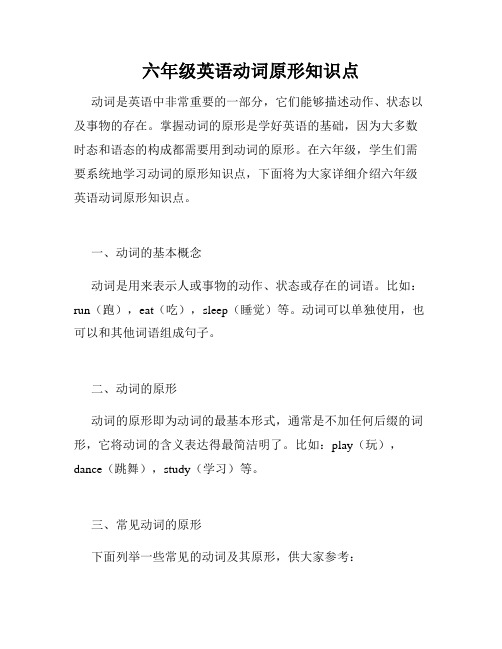
六年级英语动词原形知识点动词是英语中非常重要的一部分,它们能够描述动作、状态以及事物的存在。
掌握动词的原形是学好英语的基础,因为大多数时态和语态的构成都需要用到动词的原形。
在六年级,学生们需要系统地学习动词的原形知识点,下面将为大家详细介绍六年级英语动词原形知识点。
一、动词的基本概念动词是用来表示人或事物的动作、状态或存在的词语。
比如:run(跑),eat(吃),sleep(睡觉)等。
动词可以单独使用,也可以和其他词语组成句子。
二、动词的原形动词的原形即为动词的最基本形式,通常是不加任何后缀的词形,它将动词的含义表达得最简洁明了。
比如:play(玩),dance(跳舞),study(学习)等。
三、常见动词的原形下面列举一些常见的动词及其原形,供大家参考:1. 一般动词:run,eat,sleep,sing,play,dance,study,write,swim,jump等。
2. be动词:am,is,are。
3. 助动词:do,does,did,can,could,will,would,shall,should等。
4. 情态动词:may,might,must,ought to,need等。
四、动词原形的用法1. 动词原形作为主语:动词原形可以作为句子的主语,表达出具体的动作或状态。
例如:Sleep is important for our health.(睡眠对我们的健康很重要。
)2. 动词原形作为谓语动词:动词原形可以作为句子的谓语动词,用于表达主语的动作或状态。
例如:He runs in the park every morning.(他每天早上在公园跑步。
)3. 动词原形作为补语:动词原形可以作为句子的补语,用于补充说明主语的动作或状态。
例如:The teacher made the students study hard.(老师让学生们努力学习。
)4. 动词原形作为其他句子成分:动词原形还可以作为句子的宾语、定语、状语等。
小学英语语法专项:第六章:动词
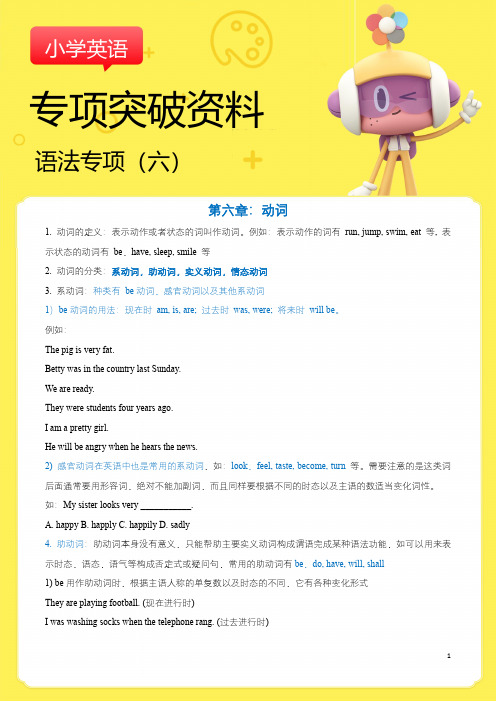
小学英语专项突破资料语法专项(六)第六章:动词1. 动词的定义:表示动作或者状态的词叫作动词。
例如:表示动作的词有run, jump, swim, eat 等, 表示状态的动词有be,have, sleep, smile 等2. 动词的分类:系动词,助动词,实义动词,情态动词3. 系动词:种类有be动词,感官动词以及其他系动词1)be动词的用法:现在时am, is, are; 过去时was, were; 将来时will be。
例如:The pig is very fat.Betty was in the country last Sunday.We are ready.They were students four years ago.I am a pretty girl.He will be angry when he hears the news.2) 感官动词在英语中也是常用的系动词,如:look,feel, taste, become, turn等。
需要注意的是这类词后面通常要用形容词,绝对不能加副词,而且同样要根据不同的时态以及主语的数适当变化词性。
如:My sister looks very ___________.A. happyB. happlyC. happilyD. sadly4. 助动词:助动词本身没有意义,只能帮助主要实义动词构成谓语完成某种语法功能,如可以用来表示时态,语态,语气等构成否定式或疑问句,常用的助动词有be,do, have, will, shall1) be用作助动词时,根据主语人称的单复数以及时态的不同,它有各种变化形式They are playing football. (现在进行时)I was washing socks when the telephone rang. (过去进行时)2)do 的用法:do是十分常用的助动词,也是经常出错的词,因为do 的变化方式比较复杂,要根据时态,人称变化成do, does, did,它们本身没有意义,但是可以帮助实义动词作否定句和疑问句,而且特别需要注意的是只要文中有do, does, did 或者否定句don’t, doesn’t, didn’t 后面所加的实义动词一定要是动词原形,不可以再用过去式或者第三人称单数。
六年级苏教版英语动词时态完全攻略

六年级苏教版英语动词时态完全攻略动词时态是英语语法中的重要部分,它用来表示动作或状态发生的时间。
在六年级的英语学习中,正确使用动词时态可以提升学生的语言表达能力和写作水平。
本文将为大家详细介绍动词时态,并提供相应的例句和练习,帮助同学们掌握动词时态的用法。
一、一般现在时(Simple Present Tense)一般现在时表示经常性的动作、习惯或客观事实。
在句子中,一般现在时的谓语动词主要有两种形式:行为动词的原形和非行为动词的基本形式。
1.行为动词的原形例句:1) I go to school by bus every day.(我每天乘公交车去学校。
)2) They often play basketball after school.(他们放学后经常打篮球。
)2.非行为动词的基本形式例句:1) The earth moves around the sun.(地球围绕着太阳转。
)2) Water boils at 100 degrees Celsius.(水在100摄氏度时煮沸。
)二、一般过去时(Simple Past Tense)一般过去时表示过去某个时间发生的动作或存在的状态。
在句子中,一般过去时的谓语动词通常需要用动词的过去式形式。
1.一般过去时的肯定句例句:1) He played soccer with his friends yesterday.(他昨天和朋友们踢足球。
)2) We visited the museum last weekend.(我们上个周末参观了博物馆。
)2.一般过去时的否定句例句:1) She didn't watch TV last night.(她昨晚没有看电视。
)2) They didn't go to the park on Sunday.(他们星期天没有去公园。
)三、一般将来时(Simple Future Tense)一般将来时表示将来某个时间会发生的动作或存在的状态。
六年级英语重点单词过去式

六年级英语重点单词过去式过去式(Past tense)是英语语法中的一个重要概念。
在六年级英语学习中,学生们需要掌握一系列常见动词的过去式形式。
过去式是表示过去发生的动作、事情或状态的形式。
以下将详细介绍几个常见的六年级英语重点单词的过去式形式。
1. go – went"go"意思是“去”。
它的过去式形式是"went"。
例如:I went to the park yesterday.(我昨天去了公园。
)2. eat – ate"eat"意思是“吃”。
它的过去式形式是"ate"。
例如:She ate an apple for breakfast.(她早餐吃了一个苹果。
)3. drink – drank"drink"意思是“喝”。
它的过去式形式是"drank"。
例如:They drank some waterafter playing soccer.(他们踢完足球后喝了些水。
)4. see – saw"see"意思是“看到”。
它的过去式形式是"saw"。
例如:He saw a bird in the tree.(他在树上看到了一只鸟。
)5. do – did"do"意思是“做”。
它的过去式形式是"did"。
例如:We did our homework together.(我们一起做作业。
)6. have – had"have"意思是“有”。
它的过去式形式是"had"。
例如:She had a great time at the party.(她在派对上过得很开心。
)7. make – made"make"意思是“制作”。
它的过去式形式是"made"。
- 1、下载文档前请自行甄别文档内容的完整性,平台不提供额外的编辑、内容补充、找答案等附加服务。
- 2、"仅部分预览"的文档,不可在线预览部分如存在完整性等问题,可反馈申请退款(可完整预览的文档不适用该条件!)。
- 3、如文档侵犯您的权益,请联系客服反馈,我们会尽快为您处理(人工客服工作时间:9:00-18:30)。
常用动词的现在分词、过去式和第三人称单数形式。
原形现在分词过去式第三人称单数形式become becoming became becomes
break breaking broke breaks
bring bringing brought brings
brush brushing brushed brushes
build building built builds
buy buying bought buys
carry carrying carried carries
catch catching caught catches
choose choosing chose chooses
close closing closed closes
cry crying cried cries
cut cutting cut cuts
dance dancing danced dances
die dying died dies
draw drawing drew draws
drink drinking drank drinks
drive driving drove drives
drop dropping dropped drops
eat eating ate eats
enjoy enjoying enjoyed enjoys
fall falling fell falls
feel feeling felt feels
find finding found finds
finish finishing finished finishes
fly flying flew flies
forget forgetting forgot forgets
get getting got gets
give giving gave gives
grow growing grew grows
hear hearing heard hears
hike hiking hiked hikes
hit hitting hit hits
hug hugging hugged hugs
keep keeping kept keeps
know knowing knew knows
learn learning learnt learns
leave leaving left leaves
let letting let lets
lose losing lost loses
make making made makes
原形现在分词过去式第三人称单数形式listen listening listened listens
mean meaning meant means
meet meeting met meets
open opening opened opens
push pushing pushed pushes
put putting put puts
rain raining rained rains
read reading read reads
ride riding rode rides
ring ringing rang rings
run running ran runs
say saying said says
see seeing saw sees
sell selling sold sells
send sending sent sends
sing singing sang sings
skip skipping skipped skips
smell smelling smelled smells
snow snowing snowed snows
speak speaking spoke speaks
stay staying stayed stays
step stepping stepped steps
stop stopping stopped stops
study studying studied studies
swim swimming swam swims
teach teaching taught teaches
tell telling told tells
take taking took takes
thank thanking thanked thanks
throw throwing threw throws
think thinking thought thinks
try trying tried tries
turn turning turned turns
use using used uses
wake waking woke wakes
wash washing washed washes
watch watching watched watches
wear wearing wore wears
win winning won wins
worry worrying worried worries
write writing wrote writes。
